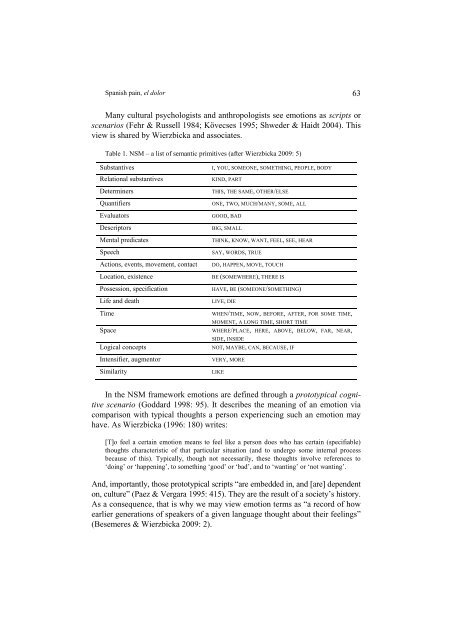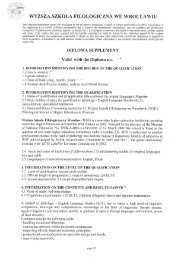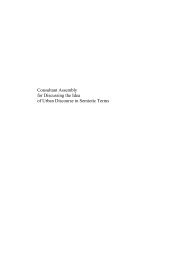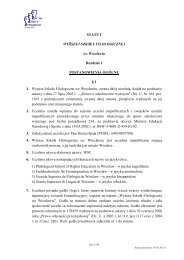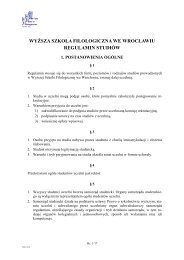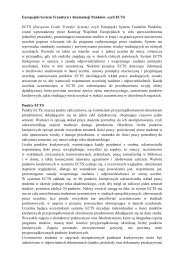s - Wyższa SzkoÅa Filologiczna we WrocÅawiu
s - Wyższa SzkoÅa Filologiczna we WrocÅawiu
s - Wyższa SzkoÅa Filologiczna we WrocÅawiu
You also want an ePaper? Increase the reach of your titles
YUMPU automatically turns print PDFs into web optimized ePapers that Google loves.
Spanish pain, el dolor 63<br />
Many cultural psychologists and anthropologists see emotions as scripts or<br />
scenarios (Fehr & Russell 1984; Kövecses 1995; Sh<strong>we</strong>der & Haidt 2004). This<br />
view is shared by Wierzbicka and associates.<br />
Table 1. NSM – a list of semantic primitives (after Wierzbicka 2009: 5)<br />
Substantives<br />
Relational substantives<br />
Determiners<br />
Quantifiers<br />
Evaluators<br />
Descriptors<br />
Mental predicates<br />
Speech<br />
Actions, events, movement, contact<br />
Location, existence<br />
Possession, specification<br />
Life and death<br />
Time<br />
Space<br />
Logical concepts<br />
Intensifier, augmentor<br />
Similarity<br />
I, YOU, SOMEONE, SOMETHING, PEOPLE, BODY<br />
KIND, PART<br />
THIS, THE SAME, OTHER/ELSE<br />
ONE, TWO, MUCH/MANY, SOME, ALL<br />
GOOD, BAD<br />
BIG, SMALL<br />
THINK, KNOW, WANT, FEEL, SEE, HEAR<br />
SAY, WORDS, TRUE<br />
DO, HAPPEN, MOVE, TOUCH<br />
BE (SOMEWHERE), THERE IS<br />
HAVE, BE (SOMEONE/SOMETHING)<br />
LIVE, DIE<br />
WHEN/TIME, NOW, BEFORE, AFTER, FOR SOME TIME,<br />
MOMENT, A LONG TIME, SHORT TIME<br />
WHERE/PLACE, HERE, ABOVE, BELOW, FAR, NEAR,<br />
SIDE, INSIDE<br />
NOT, MAYBE, CAN, BECAUSE, IF<br />
VERY, MORE<br />
LIKE<br />
In the NSM framework emotions are defined through a prototypical cognitive<br />
scenario (Goddard 1998: 95). It describes the meaning of an emotion via<br />
comparison with typical thoughts a person experiencing such an emotion may<br />
have. As Wierzbicka (1996: 180) writes:<br />
[T]o feel a certain emotion means to feel like a person does who has certain (specifiable)<br />
thoughts characteristic of that particular situation (and to undergo some internal process<br />
because of this). Typically, though not necessarily, these thoughts involve references to<br />
‘doing’ or ‘happening’, to something ‘good’ or ‘bad’, and to ‘wanting’ or ‘not wanting’.<br />
And, importantly, those prototypical scripts “are embedded in, and [are] dependent<br />
on, culture” (Paez & Vergara 1995: 415). They are the result of a society’s history.<br />
As a consequence, that is why <strong>we</strong> may view emotion terms as “a record of how<br />
earlier generations of speakers of a given language thought about their feelings”<br />
(Besemeres & Wierzbicka 2009: 2).


